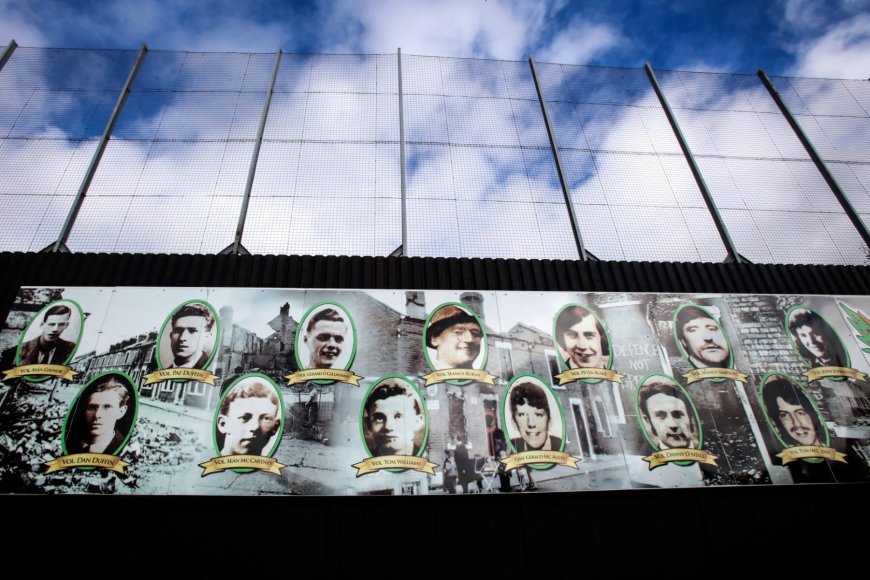The Good Friday Agreement explained

Northern Ireland next month marks the 25th anniversary of peace accords which have helped transform the UK province.
The 1998 Good Friday Agreement brought an end to more than 30 years of conflict over British rule.
- Declaration of support -
The landmark agreement, also called the Belfast Agreement, was signed on April 10, 1998 between the then-prime ministers of Britain and Ireland, Tony Blair and Bertie Ahern.
Eight political parties or groupings also signed the document, stating in the text that it was a "truly historic opportunity for a new beginning".
US president Bill Clinton sent senator George Mitchell to chair the talks.
Three decades of violence between mostly Catholic republicans on one side and mainly Protestant unionists on the other had left a "deep and profoundly regrettable legacy of suffering".
"We must never forget those who have died or been injured, and their families," they wrote.
"But we can best honour them through a fresh start, in which we firmly dedicate ourselves to the achievement of reconciliation, tolerance, and mutual trust, and to the protection and vindication of the human rights of all."
The declaration committed participants to "partnership, equality and mutual respect as the basis of relationships" and "exclusively democratic and peaceful means".
- The border -
The agreement has little specific to say about border arrangements between Northern Ireland and Ireland -- an issue that has come to the fore since Brexit.
The text promised to develop "normalisation of security arrangements and practices", including the "removal of security installations" and "other measures appropriate to and compatible with a normal peaceful society".
This created an invisible border between north and south, satisfying republicans who wanted a united Ireland, and unionists who wished Northern Ireland to stay British.
This did not pose problems when both Ireland and the UK were in the EU.
But with Britain now out, it is proving more problematic, both practically in terms of enforcing EU and UK customs rules and, as many have pointed out, psychologically.
The prospect of any return of a hard border has been seen as a violation of those Good Friday Agreement obligations.
Residents living on both sides of the border say any physical infrastructure on the frontier would reintroduce an actual divide -- and potentially fuel fresh violence.
- Disarming -
Signatories reaffirmed their commitment to the total disarmament of all paramilitary organisations.
They also confirmed their intention to achieve the decommissioning of all paramilitary arms within two years.
A new human rights commission and equality commission were charged with ensuring respect for religious and cultural preferences.
- Constitutional issues -
The negotiators recognised "the legitimacy of whatever choice is freely exercised by a majority of the people of Northern Ireland", including their freedom to choose union with Britain or Ireland.
In addition, they recognised that a majority favoured British rule and declared that Northern Ireland would remain part of Britain.
If this majority wish were to change, as indicated in a referendum, London agreed to enact legislation to allow Northern Ireland to become part of Ireland.
For this purpose, London and Ireland both revoked their constitutional claim to sole sovereignty over Northern Ireland.
- Democratic institutions -
The agreement provided for an elected 108-member assembly in Belfast, with responsibility for finance, economic development, health, education, welfare, environment and agriculture. Other responsibilities would remain with London.
The assembly would be led by a first minister and deputy first minister with a power-sharing balance between unionists and nationalists.
If both positions are not occupied, the executive cannot function -- as has happened for the last year after pro-UK unionists walked out over their opposition to post-Brexit trade arrangements.
The agreement also set up a North/South Ministerial Council, bringing together assembly members and their counterparts in Dublin on issues of "mutual interest".
bur-jj/jwp/yad/mca
© Agence France-Presse
Follow us @NairobiReviewKE for more stories.
If you have a story you'd like us to share kindly DM us directly @NairobiReviewKE on twitter or send us an email on info@nairobireview.africa.
What's Your Reaction?
































































































































































































































































































